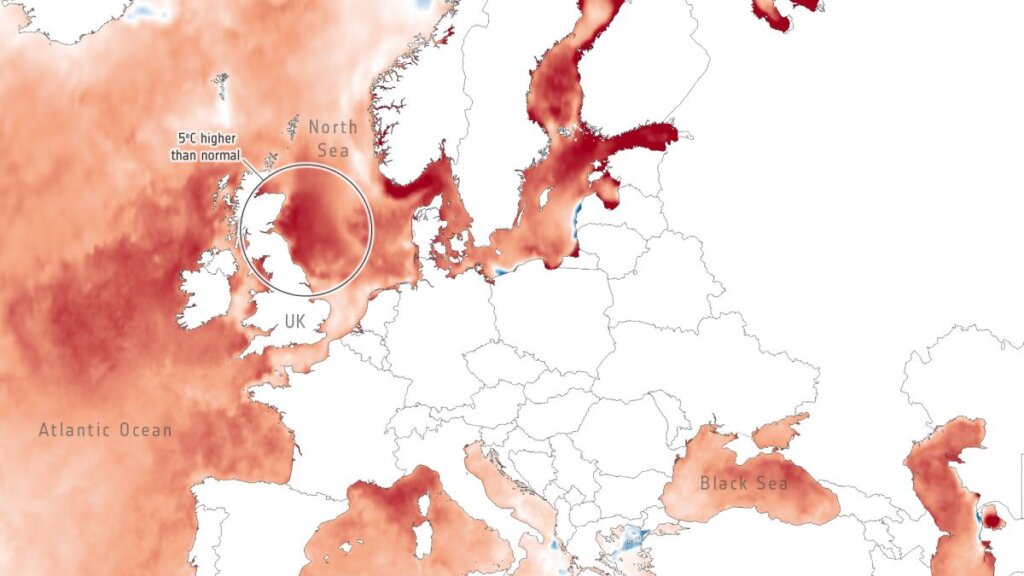Ocean water temperatures around the U.K. and Ireland are over 9 degrees Fahrenheit (5 degrees Celsius) above long-term averages for this part of the year, sparking concerns of marine life die-off later this year.
Satellite measurements show that the unexpected marine heatwave hit particularly hard around the northeastern coast of the usually cool Scotland and northwestern Ireland. Similar extremes have been detected in the Baltic Sea off the coast of Germany and Poland.
Climate scientists classify the current marine heatwave as an extreme to beyond-extreme category IV or V, which, according to the European Space Agency’s (ESA) earth observation specialist Craig Donlon, is extremely unusual for this time of the year.
Related: 10 devastating signs of climate change satellites can see from space
“Extreme marine heatwaves are not an everyday event in U.K, waters,” Donlon said in an ESA statement. “Satellite data, together with data on the ground, will allow us to document the impact of this marine heatwave including stress on the marine ecosystem, the impact on industries such as aquaculture and fisheries, modification of local wind patterns and potential rainfall events that may emerge later.”
The current heatwave is a culmination of a period of rising temperatures across the North Atlantic ocean that began in April. The U.K. weather forecasting authority Met Office reported that ocean temperatures in the North Atlantic during the month of May were the warmest since records began in 1850, reaching on average 2.25 degrees F (1.25 degrees C) above the mean values for the 1961 to 1990 period.
According to professor Albert Klein Tank, the head of the Met Office Hadley Centre, unusually mild winds over the ocean contributed to the unexpected warming.
“Typically, airborne dust from the Sahara helps to cool this region by blocking and reflecting some of the sun’s energy; but weaker than average winds have reduced the extent of dust in the region’s atmosphere potentially leading to higher temperatures,” Tank said in a Met Office statement.
The month of June is also turning out to be one of the warmest on record globally, adding further fuel to the heating oceans.
The marine heatwave in the North Atlantic ocean coincides with the onset of the warming El Niño pattern that has developed in the Pacific in recent months, but which tends to have wide-ranging consequences worldwide. Scientists worry that the current extreme marine heatwave is only a beginning of what might be a challenging summer of further weather extremes.
“This is a really startling global situation because the additional surface heating we see at this time will eventually be mixed into the ocean water column,” Donlon said. “Some of this excess heat will find its way into the Arctic Ocean via ocean currents through the Fram Strait and Norwegian Sea further exacerbating the demise of Arctic sea ice. We will be monitoring in detail to see how all these aspects evolve with great interest”.
Jules Kajtar of the National Oceanography Centre, Southampton, the U.K., told the Science Museum Group that the unusually warm sea temperatures may have devastating impacts on the marine ecosystem in the U.K. waters
“The reason we are worried is the ecosystem has not experienced these temperatures at this time of year before,” he said. “Warming oceans can make waters more acidic and drive a decrease in oxygen levels in the water.”

